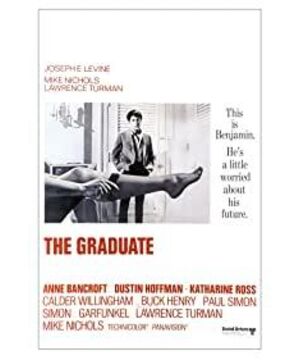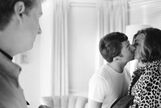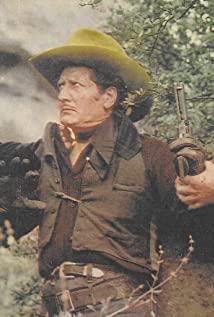The film "Graduate" shows the growth process of middle-class American youth in the 1960s with the ideal and pursuit of Benjamin, a college graduate, as the clue of the film. It tells about Benjamin's confusion, dissatisfaction and helplessness about social reality, and also reflects the social problems at that time.
The film is unique in both the use of the camera and the choice of music. The use of a large number of unconventional lenses, such as zoom, wide-angle, etc., shows the director's creative consciousness of freedom, which makes the narrative process of the whole film produce emotional fluctuations and promote the development of the plot. It mainly talks about two aspects of lens use and editing.
This film was originally intended to show the confusion, helplessness and depression in the heart of the protagonist Benjamin, but after watching the whole film, I felt that the film was very dynamic, and there were no heavy and dead scenes. There are several parts of the film that do not rely on montage techniques, but focus on the performance of scene scheduling. Through the use of long shots, the artificial rigidity brought by montage techniques is reduced.
The film begins with a close-up shot of Benjamin sitting in the cabin with a confused face, and then zooms into a panorama through a quick zoom, explaining the environment of the protagonist. In the second shot, the side close-up followed a long shot of Benjamin on the conveyor belt, and the protagonist's position was a little lonely on the right edge. When Benjamin got home, he still started with a close-up of Benjamin's face, with a fish tank in the background. Suddenly father and mother came into the picture, breaking the quiet atmosphere at this time, but the camera has always focused on Benjamin, and the whole section is the use of long shots. What followed was a long shot through a telephoto lens. Ban went downstairs and was stopped by a guest, and he strongly congratulated him with polite words. Going forward was stopped. He turned his head and was pulled back by a pair of slender hands, kissing and kissing again. In the end, he was pulled away by his father's business partner. This group of long shots showed that Ban was in trouble and could not accept the excessive concern of others. There are many characters in this continuous shot, but the scene scheduling is well organized and very natural. Mr. Robinson gives Benjamin some advice. A close-up shot of the scene where the two men sit and chat face to face. A voice-over of closing the door is added to the video during the chat, and Mrs. Robinson can be seen approaching from a distance, blurry footage. At this time, the camera began to move slightly, Mrs. Robinson came to the bar, Ban stood up to signal, after making a slight adjustment of the focus, the three figures were clearly visible, and then Ban sat down and adjusted the focus back to Ban and Robinson on Mr. Afterwards, Ben and Mr. Robinson stand up, the focus shifts, and the camera zooms to a close-up view of Mrs. Robinson, who becomes the center of focus, and Ben and Mr. Robinson blur to show her interest in their topic. The whole long shot didn't end until the time to leave the shift. After coming out of Robinson's house, Mrs. Robinson also said "Benjamin, I hope to see you soon!", which is very meaningful.
At Ban's 21st birthday party, Ban's father asked him to perform diving for the crowd in a diving suit. He had to put on the diving suit his father had given him and walk clumsily and mechanically from the room to the pool. The camera starts from Benjamin's point of view. Through the glass lens of the diving goggles, he looks at the outside world. The laughter and laughter of everyone has disappeared. The only thing that is clear is Ben's heavy, helpless and suffocating gasps. With a "thump" sound, he dived into the water and floated up naturally, but his father's big hand by the pool pressed him down again. With another "thump" sound, Ban sank to the bottom of the water for a long time. He cannot integrate into the world of his parents, the confusion about the future and the situation of no understanding make his self suppressed and bound, and his personality is annihilated and destroyed; he needs to resist, to vent, to seek stimulation to get rid of the depression And depression, which undoubtedly paved the way for his later rebellion. Ben was waiting for Elaine on the campus of Berkeley University. Benjamin got up, and through the gap of the fountain sculpture, the camera quickly pushed up, giving a very subjective perspective, allowing people to clearly see Elaith from the door of the teaching building get out. As she walked down the steps, the angle of view was adjusted appropriately. The use of this subjective perspective highlights Elaine's position in Benjamin's mind at this time.
The method of coherent editing helps us to create an illusion of continuous time and the same space for the audience with the broken footage, and this film abandons the pursuit of continuous time and space, and the way of assembly is more free.
In the film, Benjamin was forced to pick up a handbag for Mrs. Robinson and entered Elaine's room after a set of shots fully demonstrated the characteristics of Hollywood's cumulative editing: Benjamin was unknowingly fascinated by Elaine's portrait and forgot Mrs. Robinson's potential danger, when he saw the naked Mrs. Robinson through the portrait glass, could not help but startled. To express his astonishment, the film uses three consecutive head-turning movements with only slight differences in scene and camera position, which is a classic use of cumulative editing in Hollywood films.
The film gives full play to the ideographic function of space. Mrs. Robinson seduced Benjamin. She lured Benjamin into her house. The space gradually changed from outdoor to indoor hall to bedroom, from open to closed, subtly metaphorizing Benjamin's step by step into the temptation. trap. She makes him drink and asks him to unzip her until he rushes out of the bathroom naked and blocks Ben in Elaine's bedroom. The camera shot sweeps over Mrs. Robinson's naked body reflected in the frame, and expresses it through a quick combination of Benjamin's frontal expression and multiple flashes of Mrs. Robinson's chest and abdomen. It shows Benjamin's shock and panic in the face of sexual temptation.
Finally, it is worth mentioning that the theme song and interlude of this film are unique to the times, not only very attractive in the film, but also passed down to this day.
View more about The Graduate reviews











